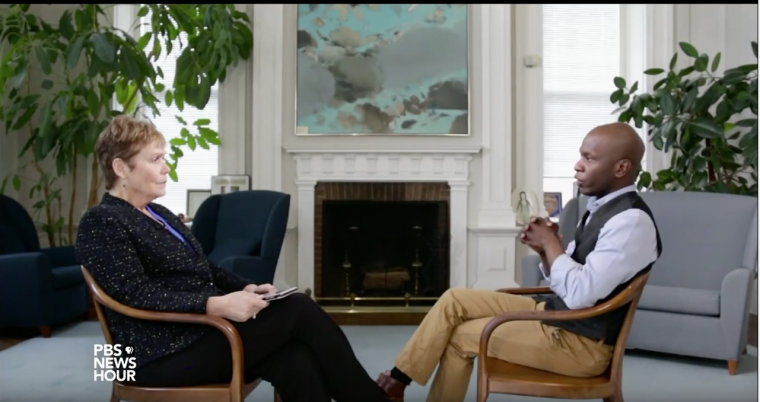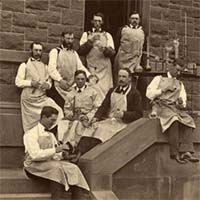NPR’s All Songs Considered featured the former Wesleyan band Overcoats in its preview of the 2016 South by Southwest Music festival in Austin Texas. Overcoats, made up of Hana Elion ’15 and JJ Mitchell ’15, have made the leap from small on-campus concerts to performances in New York City's Mercury Lounge and the Longitude Festival in Ireland. Currently, Overcoats resides in New York City where they are performing and recording new music in studio. Overcoats describe their style as “combining electronic backdrops with soaring, harmonic intimacy — a sort of Chet Faker meets Simon & Garfunkel.” Their songs "draw strength from…
Maggie Nelson ’94 received the 2015 National Book Critics Circle Award in the criticism category for her book, The Argonauts (Graywolf Press, 2015). Literary editor and book critic Michael Miller describes it on the National Book Critics Circle blog as “a potent blend of autobiography and critical inquiry…[which] combines the story of her own adventures in queer family-making with philosophical meditations on gender, art, literary history, sexual politics, and much more.” Previous works include The Art of Cruelty, a 2011 Notable Book of the Year, and Jane: A Murder, a finalist for the PEN/Martha Albrand Award for the Art of…
Photographs by Sasha Rudensky '01, assistant professor of art, are featured in the March 22 online edition of The New York Times. The images accompany an article “Should Parents of Children With Severe Disabilities Be Allowed to Stop Their Growth?” Rudensky's images are of 9-year-old Ricky Preslar, who who underwent a controversial medical intervention known as growth-attenuation therapy. When children with intellectual and developmental disabilities enter adolescence and adulthood, the simple tasks of caring for them — dressing, toileting, bathing, holding and carrying — can become prohibitively difficult for parents. Arresting a child’s growth could benefit both child and parent. Ricky currently weighs 43 pounds and…
Writing in The Washington Post, President Michael S. Roth decries the push for students to turn away from "college as exploration" and toward "college as training." "Everywhere one looks, from government statistics on earnings after graduation to a bevy of rankings that purport to show how to monetize your choice of major, the message to students is to think of their undergraduate years as an economic investment that had better produce a substantial and quick return," he writes. This movement is understandable, given the "scourge of student indebtedness" in our country, yet parents, pundits and politicians are misguided in their insistence that students…
On March 15, Wesleyan's Posse Veteran Scholars program was spotlighted on PBS Newshour, in an episode featuring interviews with President Michael S. Roth and several students. Wesleyan is first mentioned around 3 minutes with Michael Smith '18 speaking. According to the show, more than 1 million vets are using GI benefits, but most attend public or for-profit schools. The number of veterans attending top-tier colleges "is so small, it's not even known." A few years ago, the Posse Foundation—which has a long history of sending groups, or posses, of talented students "who don't fit the mold" to top colleges—started a program focused on…
The Chronicle of Higher Education has published an excerpt from a new memoir by Christina Crosby, professor of English, professor of feminist, gender and sexuality studies. The book, A Body, Undone: Living On After Great Pain, is due out later this month from NYU Press. Crosby tells the story of how her life changed after a bicycle accident in 2003, just after her 50th birthday, left her paralyzed. According to the publisher, "In A Body, Undone, Crosby puts into words a broken body that seems beyond the reach of language and understanding. She writes about a body shot through with neurological pain,…
Are the liberal arts still relevant? President Michael Roth answered this question and more as a guest on "Essential Pittsburgh," a show on Pittsburgh's NPR station. As he argues in his book, Beyond the University: Why Liberal Education Matters, Roth explains, "There's an American tradition of liberal education that goes back as far as the origins of the country and emphasizes the pragmatic dimensions of broad, contextual study. It's not so much that you take Latin and Greek or that you study religion rather than, let's say, biology, it's that whatever you study, you study it in connection to other things, understanding how what you're focused on…
Following an ISIS attack in the heart of Jakarta earlier this month, Assistant Professor of Government Ioana Emy Matesan writes on the blog "Political Violence @ a Glance" why she believes ISIS will not thrive in Indonesia. The ISIS affiliate in Indonesia remains very small, and "varies drastically from its counterpart in Syria in terms of motivations, organization, and perhaps more importantly, ability to challenge the state or claim territory." Matesan notes, "Indonesia has seen its fair share of violence, and even some earlier attempts to build an Islamic state." She provides a history of different groups that over time…
Gina Athena Ulysse, professor of anthropology, professor of feminist, gender and sexuality studies, writes an "Ode to Haiti's Neo-Comedians" in The Huffington Post about Haiti's recently cancelled election runoff. The title of her essay refers to Graham Greene's The Comedians, a book whose description read: "Set in Haiti, amid an atmosphere of brutal force and terror-ridden love, three desperate people work out their strange destinies." Ulysse writes: Relevance of The Comedians is apparent in Haiti's recently cancelled election runoff that was set for this past Sunday. Indeed, until then, the outgoing president Michel Martelly, a chap with dictatorial tendencies who leads the "Bald Headed Haitian Party"—insisted on…
The Los Angeles Times offers a preview of "Circular 14: The Apotheosis of Aristides, a new dramatic oratorio composed by Neely Bruce, the John Spencer Camp Professor of Music, which has its world premiere Jan. 23 at the American Jewish University in Los Angeles. The piece tells the story of Aristides de Sousa Mendes, a diplomat and little-known Portuguese hero to many thousands of Jews during World War II. In June 1940, nearly 120,000 refugees fleeing from Nazi persecution amassed down the road from the Portuguese consulate in Bordeaux, France. Though Portuguese dictator António de Oliveira Salazar issued a vehement directive to deny…
Forbes named Jordyn Lexton ’08 and Guy Marcus ’13 to the 2016 “30 under 30” list for 2016, and the Chronicle of Philanthropy highlighted David Lubell ’98 as one of the “40 Under 40." Under the headline, “Todays Brightest Young Stars and The Future Leaders of Everything” Forbes magazine highlighted two Wesleyan alumni in their fifth annual listings of the top 30 young leaders in 20 different categories. From an initial list of 15,000, Jordyn Lexton ’08 made the listing in entrepreneurs. Lexton is the founder of “Drive Change,” which employs previously incarcerated youth, teaching food preparation as well as providing positions in their award-winning culinary vehicle in…
On the release of the U.S. Department of Agriculture's latest dietary guidelines, The Washington Post looks back at the man responsible for starting it all: William Olin Atwater, Class of 1865 and later a chemistry professor at Wesleyan, who authored the very first dietary guidelines in 1894. According to the Post, at that time, the U.S. government provided basically no funding into nutritional research, and good nutrition meant simply getting enough to eat. But Atwater was a firm believer that nutrition was about more than simply staving off hunger. He framed the effort to figure out what foods are good for you as a moral…



